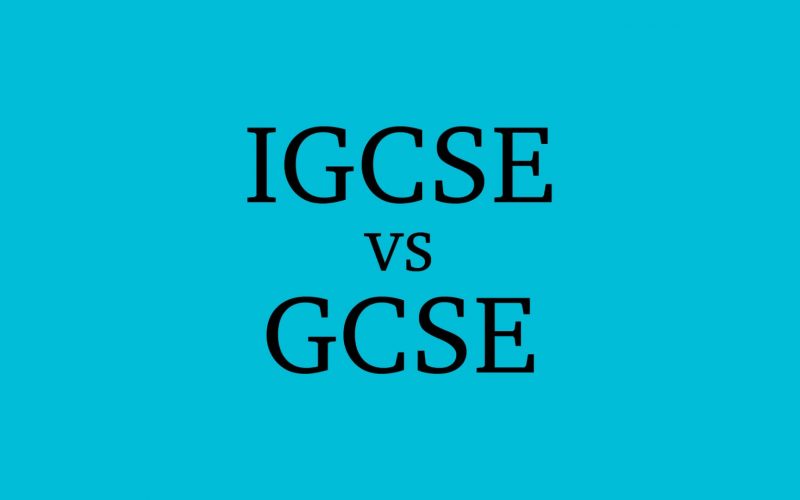Aced your IGCSE or GCSEs? High five! Now, if you took both or are unsure of which one to take between the two, you might be wondering which is harder between IGCSE vs GCSE.
The answer isn’t always so straightforward because it all depends on a few things which we will discuss in this article.
However, there’s only one key factor that can give us a clue, and that’s grade boundaries. I hope you know that they are minimum marks you need to get a certain grade in either of the exams.
So, if your grade boundaries for IGCSE an subject is lower than your GCSE boundaries, they, that might suggest that IGCSE will be a bit harder.
We will discuss this in more details below.
Table of contents
Is GCSE the same as IGCSE?
IGCSE and GCSE are quite similar qualifications. However, GCSEs are for the UK curriculum while IGCSEs are the international version.
They are both taken by students around the age of 16. So, if you’re in school in England and taking exams, you would likely be taking GCSEs. However, if you are at an international school or studying abroad, IGCSEs might be the exams you tae instead.
Also, both are very recognized qualifications.
Read: Do Universities Prefer IGCSEs or GCSEs?
Understanding IGCSE
Before we delve into IGCSE vs GCSE, let’s first understand IGCSEs. International General Certificate of Secondary Education (IGCSE) is a globally recognized qualification. It was designed to provide students with a solid foundation for further education or the workforce.
Let’s delve into what IGCSEs are, their curriculum, subjects, and grading system.
What are IGCSEs?
IGCSE stands for International General Certificate of Secondary Education. It’s a comprehensive program offered by the Cambridge Assessment International Education (CAIE) and is widely adopted by schools worldwide. IGCSE is equivalent to the General Certificate of Secondary Education (GCSE) in the UK but is recognized and valued internationally.
Curriculum:
IGCSE covers a broad range of subjects, offering flexibility for students to tailor their studies. Core subjects typically include Mathematics, English Language, and Sciences (Physics, Chemistry, Biology).
In addition, students can choose from various elective subjects, including Humanities, Arts, Languages, and Business Studies. This diverse curriculum allows students to explore their interests and strengths.
Subjects
IGCSE offers a plethora of subjects, ensuring a well-rounded education. Students can choose from subjects like History, Geography, Literature, Foreign Languages, and even Computer Science. This variety caters to individual preferences and future career paths.
Grading System:
IGCSE employs a simple grading system based on letter grades: A*, A, B, C, D, and U (ungraded). The grading is determined by a combination of coursework and final exams. A* and A are considered excellent, while C and above are generally considered passing grades.
Benefits of IGCSEs
Below are some of the Benefits of IGCSEs:
International Recognition
One of the standout features of IGCSEs is their global recognition. They are accepted and respected by universities and employers around the world. This makes IGCSE a valuable qualification for students planning to study or work internationally.
Flexible Curriculum
Also, IGCSEs offer a flexible curriculum with a wide range of subjects, allowing students to tailor their education to their interests and career goals. This flexibility encourages holistic learning and personal development.
Focus on Critical Thinking
Furthermore, IGCSEs emphasize critical thinking and problem-solving skills. Students apply their knowledge to real-world situations, promoting a deeper understanding of the subjects they study.
Practical Assessment
Many IGCSE subjects include practical assessments, which can be a valuable hands-on learning experience. It helps students develop practical skills that they can apply in various fields.
Continuous Assessment
IGCSEs often include coursework components, providing opportunities for students to demonstrate their understanding over time. This continuous assessment method can reduce the pressure of a single final exam.
Also, see: When Do You Do Your GCSEs? Everything You Need to Know
Understanding GCSEs
GCSEs, or General Certificate of Secondary Education, are a fundamental part of the British education system. In this section, we’ll unravel the basics of GCSEs, their curriculum, grading system, and why they matter.
What Are GCSEs?
GCSEs are standardized qualifications that British students typically pursue between the ages of 14 and 16, usually over two years. They serve as a crucial stepping stone to higher education or employment. GCSEs aim to provide a well-rounded education and assess a wide range of subjects.
Curriculum and Subjects
GCSEs offer a diverse curriculum. Students can choose from a variety of subjects, including English, mathematics, science, history, geography, languages, and the arts. This flexibility allows students to tailor their education to their interests and strengths.
However, It’s worth noting that the curriculum may vary slightly depending on the exam board chosen by the school.
Grading System
GCSEs use a grading system ranging from 9 to 1, with 9 being the highest grade. This system replaced the previous A* to G grades.
Higher numbers represent better performance. Achieving a grade 4 or above is considered a ‘standard pass,’ while a grade 5 and above is a ‘strong pass.’ Grades 7, 8, and 9 are equivalent to A and A* grades.
Unique Features and Benefits
GCSEs offer several advantages. They provide a broad educational foundation, fostering skills in critical thinking, problem-solving, and research. These skills are highly transferable and prepare students for further studies or the workforce.
Moreover, GCSEs are recognized internationally, which can be advantageous if you plan to study or work abroad. They open doors to A-levels, vocational qualifications, or apprenticeships.
Is IGCSE Harder Than GCSE? Well, keep reading to get your answer.
Differences Between IGCSE and GCSE
Below are the differences Between IGCSE and GCSE at a glance:
| Aspect | IGCSE | GCSE |
|---|---|---|
| Is IGCSE harder than GCSE? | IGCSE is often considered more challenging due to its international focus and broader curriculum. | GCSE is generally seen as slightly less demanding because it’s designed for UK students. |
| Definition | IGCSE (International General Certificate of Secondary Education) is recognized worldwide, emphasizing global perspectives. | GCSE (General Certificate of Secondary Education) is specific to the UK, with a focus on British education. |
| Curriculum | IGCSE offers a broader range of subjects, including international options, making it more diverse. | GCSE mainly provides traditional subjects relevant to the UK curriculum. |
| Assessment | IGCSE uses a variety of assessment methods, including coursework, oral exams, and written exams. | GCSE primarily relies on written exams, with limited coursework in some subjects. |
| Grading System | IGCSE typically uses an A*-G grading scale, similar to GCSE. | GCSE has transitioned to a numerical 9-1 grading system, with 9 being the highest grade. |
| Recognition | IGCSE is widely recognized globally, making it suitable for international students. | GCSE is recognized mainly within the UK and may be less relevant for international students. |
| Flexibility | IGCSE offers flexibility in subject choices, allowing students to tailor their education to their interests. | GCSE provides less flexibility, with a standard set of required subjects. |
| Exam Boards | IGCSE is offered by multiple exam boards worldwide, leading to slight variations in content and assessment. | GCSE is regulated by specific exam boards in the UK, ensuring a consistent national standard. |
| Accessibility | IGCSE exams are accessible to students in various countries, including those without a UK-based education system. | GCSE exams are mainly intended for students within the UK education system. |
Comparing Difficulty Levels: IGCSE vs GCSE
When it comes to education, the question often arises: Is IGCSE harder than GCSE? To provide a clear answer, let’s compare the difficulty levels of these two crucial educational pathways.
Subject Options
IGCSEs and GCSEs offer a wide range of subject options. However, IGCSEs tend to provide even more subject choices, including subjects that might not be available in GCSEs.
This can make IGCSEs more challenging in terms of deciding which subjects to study, as students have a broader array of options.
Exam Formats
While both include written exams, coursework, and practical assessments, the weightage and structure of these components can vary. IGCSEs may place more emphasis on final exams, making them more demanding in terms of exam preparation and performance.
In contrast, GCSEs may have a more balanced approach, with a significant portion of the grade allocated to coursework and practical assessments.
Assessment Criteria
The assessment criteria for IGCSEs and GCSEs are rigorous. Both qualifications require students to demonstrate a deep understanding of the subject matter, critical thinking, and analytical skills.
However, the assessment criteria can differ between exam boards and even between subjects. It’s important to note that the difficulty level can vary based on the specific subject and exam board chosen.
Data and Statistics
To provide a data-driven perspective, let’s look at statistics. According to a study, IGCSEs often have a slightly higher percentage of students achieving A* or A grades compared to GCSEs. This suggests that, on average, IGCSEs may be perceived as more challenging in terms of achieving top grades.
It’s crucial to remember that statistics can only provide a partial view of the overall difficulty. Individual experiences and perceptions of difficulty can vary widely.
Read: What is the Difference Between GCSEs & IGCSEs?
Factors Influencing Difficulty: IGCSE vs GCSE
When evaluating the question Is “IGCSE Harder Than GCSE?”, it’s essential to consider various factors that influence the difficulty level for students.
Teaching Methods
Teaching methods play a pivotal role in shaping the difficulty of IGCSEs and GCSEs. IGCSEs, being international qualifications, may incorporate diverse teaching approaches.
Teachers might emphasize critical thinking, problem-solving, and global perspectives, which can enhance the complexity of the curriculum. In contrast, GCSEs, being more standardized within the UK, may follow a more consistent teaching style.
Resources
Access to resources can significantly impact the difficulty of these qualifications. IGCSEs often draw from a broader pool of resources due to their international nature. This can provide students with a more extensive range of materials, including textbooks, online courses, and study guides.
Conversely, GCSE resources may be more focused on the UK curriculum. Having access to a wider variety of resources can be advantageous but can also lead to information overload, making it essential for students to filter and prioritize information effectively.
Exam Preparation
The way students prepare for exams can affect the perceived difficulty of IGCSEs and GCSEs. IGCSEs may require more self-directed study and discipline, as students often need to manage a wide array of subjects and resources.
On the other hand, GCSEs, with a more structured curriculum, might provide a clearer roadmap for exam preparation. However, this structure can also limit flexibility in study approaches.
Also, read: How Many GCSEs Do Students Take? 2024 Complete Guide
Individual Factors
It’s crucial to recognize that individual factors greatly influence the perception of difficulty. Students’ prior knowledge, learning styles, and personal strengths and weaknesses can impact their experience with IGCSEs or GCSEs. What one student finds challenging, another may excel in, and vice versa.
FAQs on IGCSE vs GCSE
Some students may find IGCSEs more challenging due to differences in exam formats and grading. IGCSEs often have a greater emphasis on coursework and may require more independent research, which can be demanding.
IGCSEs are known for their international recognition, making them suitable for students planning to study abroad. They may also offer more flexibility in subject choices and assessment methods.
The choice between IGCSEs and GCSEs depends on your education goals and preferences. Consider factors such as future university plans and the subjects you want to study. Consult with your school or educational advisor for personal.
Conclusion
Finally on the matter, of IGCSE vs GCSE, IGCSEs are generally considered harder due to their broader subject options, diverse teaching methods, and international resources. However, this doesn’t mean GCSEs are easy; they have their challenges, such as a structured curriculum.
Ultimately, the perceived difficulty depends on individual factors. Students should choose based on their goals and learning preferences, recognizing that both qualifications offer valuable educational experiences.
References
- chsonline.org.uk – IGCSE vs GCSE
- thinkstudent.co.uk – Which is harder -IGCSE vs GCSE?
- studyinternational.com – IGCSE vs GCSE



